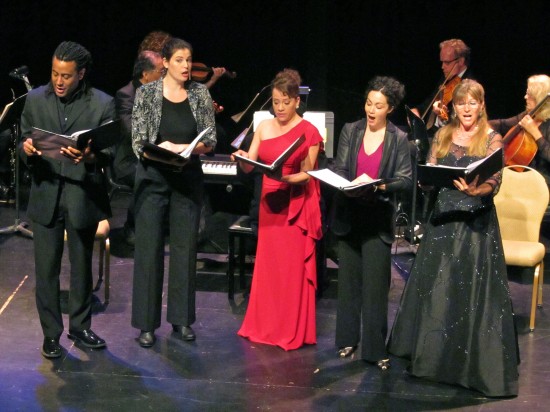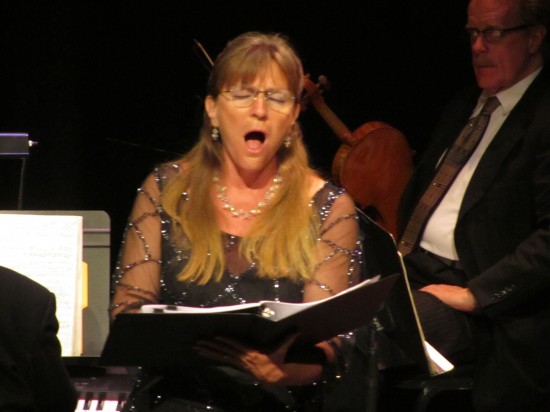George Frideric Handel was a German composer living in England who wrote Italian operas based on Greek legends for an English audience.
The first hurdle for an American audience attempting to get a handle on Handel is to get used to Italian names of the Greek characters. Thus Theseus becomes Teseo and Aegeus becomes Egeo. Medea, by the way, retains her name, but Athena, the patron goddess of Athens, is replaced by the Roman goddess Minerva. Get used to it.
According to Chapter XX of Bullfinch’s Mythology,
THESEUS was the son of AEgeus, king of Athens, and of AEthra, daughter of the king of Troezen. He was brought up at Troezen . . . . AEgeus on parting from AEthra, before the birth of his son, placed his sword and shoes under a large stone and directed her to send his son to him when he became strong enough to roll away the stone and take them from under it. When she thought the time had come, his mother led Theseus to the stone, and he removed it with ease and took the sword and shoes . . . .
Having overcome all the perils of the road, Theseus at length reached Athens, where new dangers awaited him. Medea, the sorceress, who had fled from Corinth after her separation from Jason, had become the wife of AEgeus, the father of Theseus. Knowing by her arts who he was, [she feared] the loss of her influence with her husband if Theseus should be acknowledged as his son . . . .

Handel has elaborated on this legend by introducing Princess Agilea and a couple of love triangles. Teseo and Agilea are mutually and madly in love, but King Egeo has lustful designs on the young woman, and Medea has – but let Donald Pippin tell you in his own words:
Medea, the famed sorceress, has long been remembered for a spectacular day in which, to punish her faithless lover, she murdered their two small children, set fire to her successful rival and poisoned the girl’s aged father before riding off on a flaming chariot drawn by winged dragons.
Now ten years later, we are soon to find out if Medea has mellowed – – or not. The signs are not good. Despite knowing all too well that love has ever been her mortal enemy, she is in love again. Consumed as never before by an implacable but irresistible passion, she broods, she pines, she languishes, she burns. For whom? None other than Teseo, the brave and handsome young soldier, hero of the day, who almost single-handedly has defended the city with a ferocity thought to be found only in legend.
Never timid, never inclined to hold back, she is not slow to act. With smoldering eyes and melting smiles, she approaches Teseo seductively and in her softest, most languorous tones asks him if his interests lie exclusively on the rugged battlefield. Has he not yet felt the need for the sweeter things in life? Have the charms of a woman never tempted him? Now that the battle is over, is he not perhaps ready for love? Teseo, totally failing to grasp what she is driving at, replies with rapturous candor that she understands him perfectly. Indeed, she must have read his mind. How else could she have known that he is madly in love with beautiful, adorable Agilea?
A setback, no doubt. But for Medea, the battle has just begun, a battle that she is determined not to lose. One does not envy beautiful, adorable Agilea.
For many years Pocket Opera has included an opera by Handel as part of its season, and the format is always the same modified concert-style with all recitatives being replaced by Donald’s inimitable comments. Teseo‘s cast is typical:

In terms of personnel, there are 3 males and 2 females, but in musical terms 4 of the voices are female. At the premiere of the opera in 1713 the two high-voiced male roles were sung by castrati, but that is not practical today because, as Pippin says, “They don’t make castrati the way they used to – it is not a craft that is passed on from father to son.”
All five singers are seated on stage throughout; a singer would rise and move center-stage with her book, sing her aria, and return to her seat (I use the feminine pronoun because Brad Kynard sat most of the time, rising only for the low part in the only two ensemble numbers and for one brief aria near the end of the opera). In addition to singing her part, veteran (she has sung the female “heavy” in practically every Handel that Pocket Opera has done as far back as I can remember) Marcelle Dronkers showed by facial expression and body language that she was fully into Medea’s personality.
Aim�e Puentes was usually involved when singing her Princess Agilea role, and Brad Kynard was every inch Minerva’s Priest in his one aria. But on the whole, the action part of the performance was not up to the standard set two years ago with Rinaldo (Search for my other reviews of Rinaldo on Splash or on my blog), about which I wrote, “rather than sit woodenly when they are not singing, the soloists remain in character throughout, responding to the other singers and to Donald with appropriate facial expressions and body language.” Last Sunday, alas, when they were not singing, they were mostly staring into space, trying not to look bored.
The singing, however, was all excellent. No complaints on that score.
And not to worry. Despite all the dire implications of tragedy, this legend has a happy ending. Indeed, it is necessary that Teseo survive this ordeal or else the more familiar legend of Theseus slaying the Minotaur could never have occurred. Speaking of which, let me close this review with my personal connection to this latter legend.
While on an Elderhostel trip to Greece some years ago I actually stood on the hill from which King Aegeus would watch for the Greek ship returning from Crete. With only the ruins of Poseidon’s temple behind me, it was easy to believe that I was Aegeus, and that the seemingly tiny ship on the horizon was Theseus’ square-rigged ship, still with a black sail signalizing his death – he had “forgotten” to change it to a happy white one. Fortunately, I “came to” and did not cast myself over the cliff.
Photos: Except as noted, Robert Selinsky for Pocket Opera
This review by Philip G Hodge appeared in sanfranciscosplash.com on June 7, 2012.









